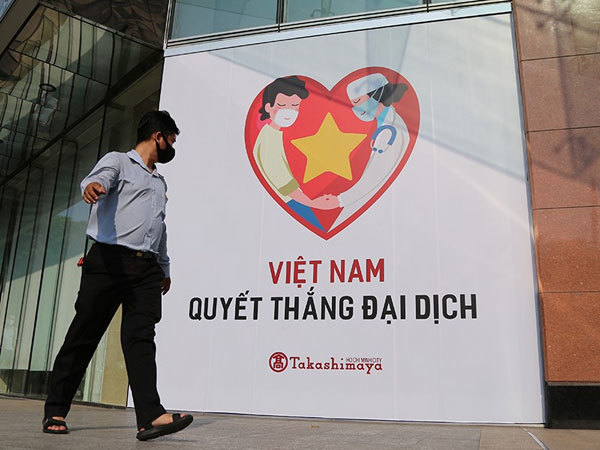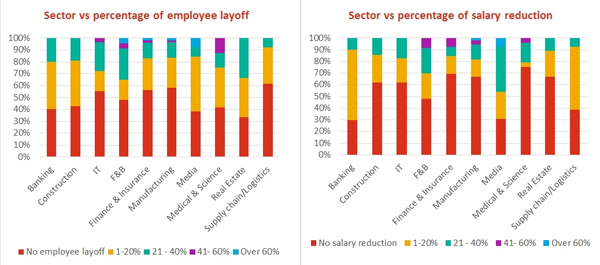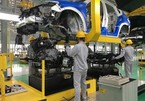 |
| Comapnies prepare plans to navigate their workforce through the crisis while maintaining business performance. |
330 human resources (HR) specialists shared COVID-19 contingency plans with Adecco Vietnam in its latest survey in May. Most respondents were at manager or director level, working at multinational companies in Vietnam, 77 per cent of whom filled out the questionnaires completely.
According to the survey, 93 per cent of companies’ financial performance has been affected by COVID-19. Among those, 43 per cent were severely impacted businesses seeing revenue declining by 21-40 per cent. The top three industries with revenue negatively struck by COVID-19 are food and beverage (47 per cent), real estate (56 per cent), and manufacturing (44 per cent).
Alongside declining revenue and business activities, many companies face tough decisions on their labour force, including employee layoffs or salary reduction. 30 per cent of businesses reduce the number of employees by 1-20 per cent and 16 per cent of businesses must cut headcount by 21-40 per cent.
The media sector encounters a severe setback on employees with 46 per cent businesses reducing up to 20 per cent of their employees. More seriously, 7.69 per cent even terminated the contracts of over 60 per cent of their labour force. Also struggling with paying salaries, 38 per cent of media companies reduced wages by 21-40 per cent.
On a brighter note, while there are no positive signs regarding revenue in supply chain and logistics, up to 62 per cent of companies in this sector maintain their workforce and only 7.69 per cent of companies suffer 21-40 per cent layoffs. Other sectors where most companies did not let go of employees are IT (55 per cent) and finance and insurance (54 per cent).
 |
For further risk mitigation, 58 per cent of companies choose to freeze hiring, especially large enterprises (75 per cent) rather than SMEs (50-56 per cent roughly). Other labour cost reduction initiatives include postponing salary, incentive and performance review (37 per cent), cancelling internship programmes (28 per cent), reducing working hours (26 per cent), requiring temporary unpaid leave (16.5 per cent), suspending permanent contract extensions (12.46 per cent). When making those decisions, 69 per cent of companies collaborated or negotiated with their employees in advance rather than acted unilaterally.
In estimation, 31 per cent of businesses expect to recover within the next 3 months, and the rebound period will take longer from 3-6 months for the other 29 per cent. 8 per cent of companies will not get back to normal until next year.
This urges companies to be responsive, resilient, and resourceful under such unique circumstances. During this time, the behaviours being most important from the manager role are collaboration, problem-solving, and adaptability. Following are empathy and supportive attitude and keeping staff engaged with company values and culture.
Andree Mangels, general director of Adecco Vietnam stated that, "Given the recent unfortunate increase of COVID-19 cases in Vietnam, leading some cities to return to social distancing and remote working, it’s a unique opportunity for managers to re-think their leadership approach. High EQ is now the gold standard for leaders through this potentially stressful period. We recommend to invest time into deep listening combined with the ability to minimise quick judgment and refraining from providing only advice. Promoting a culture of compassion and caring will help keep your people motivated, engaged, and productive.’’
In addition, companies are increasingly going digital. In terms of employees’ expectations, 46 per cent of survey respondents prefer companies to provide constant updates on business performance and upcoming plan. 39 per cent of them also want their company to work on solutions for similar crises in the future. IT investment and digital working are also highlighted in the survey to facilitate the digital future of work.
Last but not least, the pandemic raises the need for acquiring new skills and flexible working. Approximately seven in 10 HR leaders said problem-solving and self-discipline are two new skills HR leaders are looking for in future candidates. Moreover, big corporates also highly appreciate talent with resilience and the ability to lead through digital transformation.
In Vietnam, HR professionals are staying ahead of the curve with 56 per cent confirming that reskilling or upskilling employees on new ways of working are their top priority in the next three months. They also focus on boosting employee engagement (54 per cent) and accelerating remote working policies (36 per cent). VIR
Thanh Van

Business plans thrown into turmoil amid COVID-19 spike
Dang Thanh Nga, 40, in Ha Noi called 10 sewers back to work for her garment factory just a few days ago as orders increased last week.

Auto firms urged to have suitable business plans amid COVID-19
Automobile producers are observing the complex changes of the second wave of the COVID-19 pandemic to adjust their businesses.